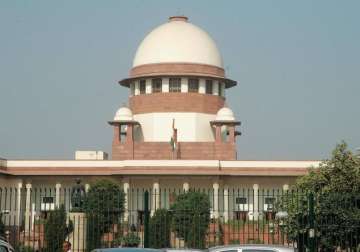'Don’t get carried away with greatness of the person involved': SC tells petitioner seeking re-probe in Mahatma Gandhi assassination
The apex court made it clear that it would go only by law and not the stature of the person involved in the case.

The Supreme Court today posed searching questions to a petitioner seeking re-investigation in the assassination case of Mahatma Gandhi and asked him to satisfy it on aspects of delay and his locus to raise the issue.
The apex court made it clear that it would go only by law and not the stature of the person involved in the case.
A bench comprising Justices S A Bobde and L Nageswara Rao told the petitioner not to get carried away by the greatness of the person involved as the issue was whether there was any evidence available in the matter.
"You (petitioner) have to answer a couple of very important points. One of them is delay. The other is locus. The third is the fact that because of the delay, every piece of evidence pertaining to the incident is lost," the bench said adding that almost all witnesses related to the case have passed away.
The court was hearing a plea filed by Mumbai-based Dr Pankaj Phadnis, a researcher and a trustee of Abhinav Bharat, who has sought reopening of investigation on several grounds, claiming it was one of the biggest cover-ups in the history.
Meanwhile, Phadnis requested for time to respond to the report filed by senior advocate Amarendra Sharan, who has been appointed as an amicus curiae to assist the court in the matter.
Sharan, in his report filed in the court, has said there was no need to re-investigate Mahatma's assassination case as the conspiracy behind the murder and identity of assailant Nathuram Vinayak Godse who had fired the bullets have already been duly established.
The bench granted four weeks time to the petitioner to file his response to the report of the amicus. During the hearing, the bench told the petitioner that the issue was whether any admissible evidence was available at present.
"Don't get carried away with the greatness of the person involved. This is about whether there is any evidence available or not," the bench observed adding, "court will act according to the law and rule and not as per stature of person involved."
Sharan, in his report filed in the court, has said claims regarding existence of British special intelligence unit by the name 'Force 136' and its alleged role in the assassination was not substantiated.
The report has said that records of the case established that an independent judiciary had adjudged the crimes of Nathuram Vinayak Godse and other accused in the matter and justice was served.
Gandhi was shot dead at point blank range in New Delhi on January 30, 1948 by Godse, a right-wing advocate of Hindu nationalism. The assassination case had led to the conviction and execution of Godse and Narayan Apte on November 15, 1949.
"The bullets which pierced Mahatma Gandhi's body, the pistol from which it was fired, the assailant who fired the said bullets, the conspiracy which led to the assassination and the ideology which led to the said assassination have all been duly identified," the report has said.
The petitioner has questioned the 'three bullet theory' relied upon by various courts to hold conviction of accused Godse and Apte, who were hanged, and Vinayak Damodar Savarkar who was given benefit of doubt due to lack of evidence.
Regarding the claim by the petitioner about the alleged fourth bullet, the amicus has said that as per records of the case, only three empty cartridges and two spent bullets were found at the place of occurrence and no fourth spent bullet or empty cartridge was found from there.
The report has also said Godse was arrested at the spot with the murder weapon, a semi automatic Beretta pistol which could load seven cartridges at a time, and the records suggested that only three bullets were fired.
Phadnis has challenged the decision of the Bombay High Court which on June 6, 2016 had dismissed his PIL on two grounds -- firstly, that the findings of fact have been recorded by the competent court and confirmed right up to the apex court, and secondly, the Kapur Commission has submitted its report and made observations in 1969, while the present petition has been filed 46 years later.